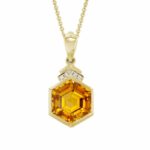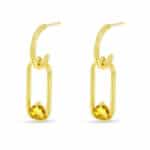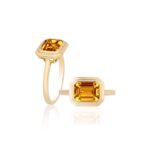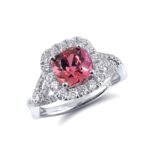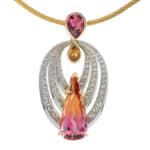By Avery Quigley, American Gem Society
People born in November are blessed with two beautiful birthstones: Citrine and topaz.
These two dazzling gemstones have rich histories and folklore. Continue reading to learn more.
History of Citrine
The name “citrine” was used to refer to yellow gemstones as early as 1385. However, because the gemstone’s color resembles topaz, the two November birthstones have a history of being mistaken for each other.
In the mid-18th century, mineralogists realized that amethyst and smoky quartz could be heat treated to produce golden honey hues of citrine, contributing to an abundance of affordable enhanced gemstones on the market.
Citrine Folklore
Citrine has been loved for thousands of years as a symbol of manifestation, wealth, and imagination. Its yellow color evokes the warmth of the sun and life-giving energy.
In ancient times, people believed citrine could calm tempers, soothe anger, and manifest desires. Egyptians used citrine gemstones as talismans, the ancient Greeks carved iconic images into them, and Roman priests fashioned them into rings. According to legend, the gemstone made men more handsome and intelligent while it helped women bear more children and increase happiness.
According to lore, carrying citrine would attract love and prevent heartbreak. It was believed that it could instill confidence and healing wisdom as well. People felt that it was one of the only gemstones that did not hold negative energy and actively repelled it.
How to Buy Citrine
Citrine is one of the most affordable and abundant gemstones on the market. Whether you’re shopping for a birthstone for a November birthday, a 13th wedding anniversary, or just an affordable piece of jewelry to complement any style, citrine is the perfect gift.
Because most citrine gems on the market have been heat treated—and because it takes an expert to detect these enhancements—it’s wise to shop with an American Gem Society jeweler who can help you choose the best gemstone for your taste and budget.
Citrine is readily available in sizes up to 20 carats—and, because its price doesn’t rise exponentially with carat weight, big gemstones are relatively inexpensive.
History of Topaz
Yellow gems have been called variations of the name topaz for thousands of years—long before mineralogists determined that topaz occurs in a range of colors, and that many yellowish gemstones actually belong to other mineral species.
During the Renaissance in Europe, people believed that topaz could break spells and quell anger. Hindus deemed topaz sacred, believing that a pendant could bring wisdom and longevity to one’s life. African shamans also treated the gemstone as sacred, using it in their healing rituals.
Russia’s Ural Mountains became a leading source of topaz in the 19th century. The prized pinkish orange gemstone mined there was named Imperial topaz to honor the Russian czar, and only royals could own it.
Below are some exquisite examples of citrine. The honey-gold necklace is by Artistry Ltd. Immediately after, a magnificent pair of earrings by Bravani. And Goshwara has the perfect ring for any occasion.
Ancient Greeks and Romans used topaz for strength and to prevent injuries. Around that time, Europeans linked the sunny stone to Apollo, the god of the Sun. Later during the Renaissance in Europe, people believed that topaz could break spells and quell anger.
In ancient times, people believed that topaz would prevent sleepwalking, reduce inflammation, and improve eyesight. It was also believed that the gemstone changed color when near food or drink that had been poisoned. Healers and physicians used it in all sorts of medical treatments.
Topaz has also been tied to the moon. It was believed that it’s healing power and color intensity waxed and waned with lunar phases.
Modern lore suggests topaz will bring about love and good fortune while uncovering lies and deceit. Some feel that the gemstone will reduce feelings of tiredness and promote good moods.
How to Buy Topaz
Since the discovery of large topaz deposits in Brazil in the mid-19th century, topaz has become much more affordable and widely available for all.
Topaz is a traditional birthstone jewelry gift for those with November birthdays. It’s also given to celebrate 19th wedding anniversaries and acknowledges 4th and 23rd wedding anniversaries, as well.
When buying topaz, realize that this gemstone is most often treated with irradiation to produce desirable colors—particularly blue. Because these processes so closely resemble how topaz forms in nature, there is practically no way to determine whether a gemstone has been treated.
Imperial topaz is the most highly prized for its intense reddish orange color. Yellow, orange, and brown gemstones are more common and less expensive—although these can be treated with heat to enhance the pink and red hues.
Now that you know a little more, you might have some shopping ideas. Visit ags.org/findajeweler for help buying citrine and topaz.
